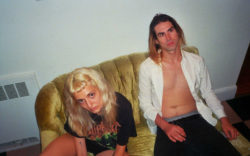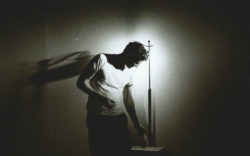R.E.M. bid farewell in 2011, but bassist Mike Mills has not slowed down. In addition to touring as a member of singer-songwriter Joseph Arthur’s backing band, he contributes writing and guitar duties to The Baseball Project (alongside former bandmate Peter Buck), and is currently working on a “violin rock band concerto” with an unnamed collaborator in Athens. “It’s busy times,” says Mills with a chuckle. “In some ways, it’s more busy. R.E.M. would take a year or two off, and I haven’t taken a year off in a while.”
Mills returns to Athens Saturday, Nov. 8, when a supergroup celebrating the power-pop band Big Star’s enigmatic Third/Sister Lovers plays as part of the Slingshot Festival and UGA Spotlight on the Arts’ free outdoor concert on College Square. (For more on the concert, click here, and read Blake Aued’s Big Star essay here.)
Flagpole caught up with Mills on a grey day over a cup of tea.
Flagpole: Do you remember when and where you first heard Big Star?
Mike Mills: At the church, when Peter [Buck] and Michael [Stipe] and Bill [Berry] were living there, and I was more or less living there. Peter was showing us his record collection, and there was all this stuff I hadn’t heard. And there was Big Star. I didn’t like Third right away. It takes a bit of listening to appreciate what’s going on there. But it’s pretty powerful stuff.
FP: Do you think of them as an influence on R.E.M.?
MM: They’re an influence in the sense that—we never tried to make a song that sounded like any of theirs, we never tried to write like them at all. Simply in the sense of trying to create a record, to make an album that was as strong, top to bottom, as the first or second Big Star records. It wasn’t like we sat around and thought about that in the studio, but somewhere in the back of our minds, it was, “It sure would be nice to make a record that good.” There were a lot of bands we were listening to and enjoying, but we weren’t trying to sound like anybody. But just in terms of knowing what we could accomplish as a four-piece band—that’s a pretty good bar to go after.
FP: What did you think of Nothing Can Hurt Me, the Big Star documentary?
MM: I thought it was great. It was a very loving and kind overview of what happened to them and what they went through. They’re sort of the epitome of the great band/no luck [situation]. They put out two of the best records ever made, and nobody ever heard them… It’s really the archetypal version of that story.
FP: How did the tribute come together?
MM: Ken Stringfellow and Jon Auer had been playing with Alex [Chilton] and Jody [Stephens] as the Posies for some time, and they were gonna do a show at South by Southwest, and I was going to that show anyway. A week before that, Alex died. So Jody called me and said, “Will you come to what is now a memorial show?” and I said, “Of course.” Right about that time, Chris Stamey had relocated the charts to the strings for Third, and he was planning on doing something with Alex, anyway…
It’s not exactly a tribute; it’s not exactly a reproduction. I guess “tribute” is as close as anything. But it’s a celebration, really… It’s music we love, and it’s a way for us to share music we love with other people who love it, or other people who might not have had the chance to discover it. This way, we can bring it to people and let them see if they like it. Because it’s not a known record. Big Star in general deserves a better hearing than they got. The third record’s not for everybody. It’s a difficult record, in many ways. But it’s very rewarding when you get to it. And to see that the beauty of it stands up in being played by all these other people—it lets you know there’s a lot of quality there.
Guys like David Lowery are out there fighting the good fight, but they’re up against practical economic reality.
FP: What’s it like for you, after such a long career playing your own music, to do something like the Big Star band? Is it freeing?
MM: Oh, yeah. The music is the center of attention in this band. It’s easy to stay in the back and have fun and relax. Certainly you wanna do it right, but it’s not the pressure of going out and playing your own songs to 50,000 people. It’s a lot more relaxed. I get wound up—we wanna do this right, and we work really hard at it—but yeah, as a labor of love rather than a labor of work; it’s easier to relax and have fun.
Plus, the music’s really fun to play. You wouldn’t think that, listening to some of the songs on Third, but even the sad stuff—all the people that sing with us interpret the music extremely well. For me, as a bass player, I get to sit in the back and watch. It’s very enjoyable.
FP: You’ve got the REMTV box set coming out later this month. What stands out to you watching those performances now?
MM: I don’t really do that [laughs]. I’m sure I’ll see more as time goes on. But I can’t imagine sitting down and watching all six [DVDs]. It’s curious and interesting when I watch it, but it doesn’t draw me in. Those were kids. They were me, but they were different mes.
FP: So you feel detached from it?
MM: Kind of, in the sense that any record that’s more than a couple years old is over and done. You’ve moved on and done other things. It exists as a curiosity for me. For a fan, it’s really fun and exciting to listen to. For me, I don’t listen to my own stuff for fun, anyway. So it’s not really fun to go back and watch an entire concert of it. It was nice when we did the Jim McKay retrospective here, and they played Tourfilm. I went to see it, and I enjoyed it. It’s fun; it brings back a lot of memories. In that sense, it’s really cool. It reminds you of the people you got to play with and the people you knew back then, some of whom are no longer around. Sure, as a historical piece, it’s great fun. But it’s not something I’m gonna spend much time on.
FP: Do you think R.E.M. could exist in 2014 as a new band?
MM: I wouldn’t do it. There’s too much competition now. There are still plenty of rabid fans for contemporary bands, but I don’t think it’s as all-consuming in people’s lives as it used to be. There are too many other things going on. The Internet offers you access to the world, and you didn’t have that before. You weren’t able to go find a million things to like and spend 10 minutes on each one. You found a few and you stayed with them. The world has dramatically shifted… The Internet makes it a lot easier to achieve a certain level of awareness.
FP: But it doesn’t translate into success.
MM: It depends how you define success. You can make a living, absolutely. It’s much easier to get to the point where you can establish a career and make a living. But it’s much more difficult to be huge. In rock music, it’s almost impossible. If you wanna be huge, it’s either pop music or country music, which is almost pop music, or hip hop. And even then, it’s not as easy. Radio is not the force it used to be. You can go viral on YouTube, but that’s not necessarily gonna translate into anything.
FP: What’s your take on streaming services like Spotify?
MM: Part of me thinks it’s ridiculous that they pay so little to musicians, but part of me thinks, well, they pay what they have to. They’re gonna pay what they can get away with. Aesthetically, it’s offensive. Pragmatically, you take what you can get. Guys like David Lowery are out there fighting the good fight, but they’re up against practical economic reality. I wish them all the best.
Then you’ve got somebody like Dave Allen [from] Gang of Four, who has decided to buy in rather than fight it. He works with bands to try to help them maximize their potential in the current economic climate. That involves doing things that were anathema to us. Getting your music on commercials and TV. That’s something we never did, and we won’t, but a lot of people see it as the way to get known and make money. Then again, that changes the idea of music as close to people’s hearts, because it is disposable now, and it is the soundtrack to a car commercial, or whatever, and as a result it’s not quite the life preserver for people it used to be.
FP: Switching gears totally, you’ve been vocal about the Atlanta Braves’ move.
MM: I’ve learned some things I didn’t know. There are two sides to every story. I still think it’s wrong. I think baseball belongs in the downtown part of the city, and that’s where it should always be. There are extenuating circumstances to this move, but I’m still not in favor of it. It’s just insane to move [the stadium] up there to Cobb County. To a really crappy place. The stadium will be beautiful, but the area’s terrible.
FP: Are you in favor of keeping Fredi Gonzalez on as manager?
MM: I think Fredi deserves another year, absolutely. He can’t make ’em hit the ball. It’s possible that the black holes created by [Dan] Uggla and B.J. Upton are too much to overcome. Chris Johnson’s too erratic; Jason Heyward hasn’t quite [reached] his potential yet. B.J. Upton will not be the starting center-fielder next year. I’m 99 percent sure of that. I don’t know who’s gonna play second base. We’ll have to find somebody.
WHO: Big Star Third, The Glands, New Madrid, Ruby the Rabbitfoot, Blacknerdninja
WHERE: College Square
WHEN: Saturday, Nov. 8, 4–8 p.m.
HOW MUCH: FREE!
Like what you just read? Support Flagpole by making a donation today. Every dollar you give helps fund our ongoing mission to provide Athens with quality, independent journalism.










